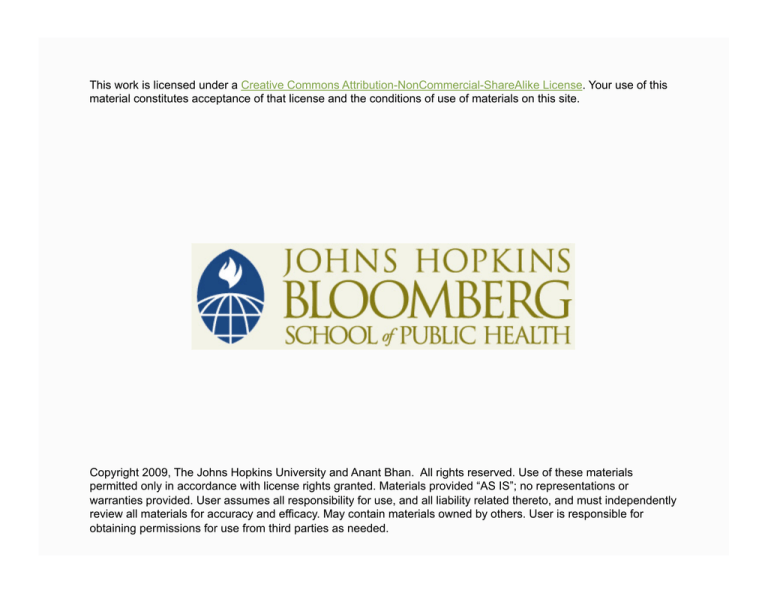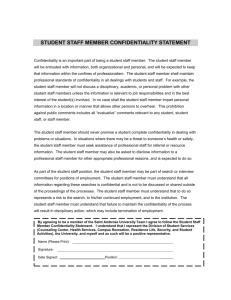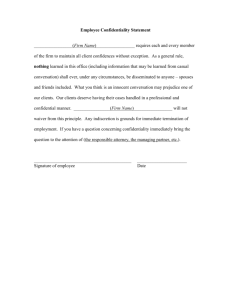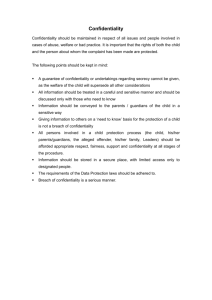
This work is licensed under a Creative Commons Attribution-NonCommercial-ShareAlike License. Your use of this
material constitutes acceptance of that license and the conditions of use of materials on this site.
Copyright 2009, The Johns Hopkins University and Anant Bhan. All rights reserved. Use of these materials
permitted only in accordance with license rights granted. Materials provided “AS IS”; no representations or
warranties provided. User assumes all responsibility for use, and all liability related thereto, and must independently
review all materials for accuracy and efficacy. May contain materials owned by others. User is responsible for
obtaining permissions for use from third parties as needed.
Section B
What Do the Guidelines Say on Privacy and Confidentiality?
The ICMR Guidelines for Biomedical Research
The Indian Council for Medical Research (ICMR) guidelines include
the principles of privacy and confidentiality as one of the guiding
principles
3
Principles of Privacy and Confidentiality
Principles of privacy and confidentiality whereby, the identity and
records of the human subjects of the research or experiment are as
far as possible kept confidential, and that no details about the
identity of said human subjects, which would result in the disclosure
of their identity, are disclosed without valid scientific and legal
reasons which may be essential for the purposes of therapeutics or
other interventions, without the specific consent in writing of the
human subject concerned, or someone authorised on their behalf;
and after ensuring that the said human subject does not suffer from
any form of hardship, discrimination or stigmatisation as a
consequence of having participated in the research or experiment
4
Safeguarding Confidentiality
Safeguarding confidentiality—the investigator must safeguard the
confidentiality of research data, which might lead to the
identification of the individual participants
Data of individual participants can be disclosed under the following
circumstances:
a. Only in a court of law under the orders of the presiding judge or
b. There is threat to a person’s life or
c. In cases of severe adverse reaction may be required to
communicate to drug registration authority or
d. If there is risk to public health it takes precedence over
personal right to privacy and may have to be communicated to
health authority
5
ICMR Guidelines: Confidentiality with Respect to Publications
Investigator’s publication plans should not threaten the privacy or
confidentiality of subjects
-
-
Obtain consent for publication
In case of photographs, slides, videos, etc., of the participant,
it is ideal to obtain prior consent to do so beforehand;
identification features should be camouflaged if needed
6
A Before and After Photograph
Source: Courtesy of Indian Journal of Dermatology, Venereology, and Leprology
7
ICMR Guidelines: Epidemiological Studies
Maintaining confidentiality of epidemiological data is absolutely
essential
Some population data may have implications for issues like national
security and these need to be carefully evaluated at the beginning
8
ICMR Guidelines: Human Genetic Studies
Pedigree studies: special privacy and confidentiality concerns arise
in genetic family studies because of the relationship between the
participants
-
Family members are not entitled to know each others’ diagnosis
One needs to address issues related to breach of confidentiality if
other family members find out
- If proband is used, he/she might put pressure on other family
members to participate
-
Direct recruitment through phone calls could invade privacy and
contact through personal physician may have implications for
continued health care access
9
ICMR guidelines: Human Genetic Studies
Genetic screening: Confidentiality should be maintained in handling
of results with emphasis on responsibility of individuals with a
positive (abnormal) result to inform partners and family members
Genetic data should be normally delinked to maintain
confidentiality
Law protects confidentiality of medical information but this is not
absolute
10
ICMR Guidelines: Human Genetic Studies
Anonymous testing: researchers may conduct anonymous testing on
general population in order to establish prevalence of genetic trait
diseases
For individual benefit, code of anonymity may be broken only with
the approval of IEC
11
ICMR Guidelines: Disaster Research
Makes research participants especially vulnerable
Special care needed to protect the privacy and confidentiality of
research participants in disaster context
12
Limitations of Protections Offered
Certificates of confidentiality
DHHS/NIH U.S.A.
- It helps researchers to protect the privacy of subjects in
research against compulsory legal demands (e.g., court orders,
subpoenas)
-
This is found useful in cases of genetic information,
psychological well-being, sexual attitudes and preferences,
substance abuse, reputation employability and finances,
socially stigmatising conditions
Such protections are not available in an Indian context, hence, one
needs to be cautious while collecting such data or undertaking
research on these issues
13







